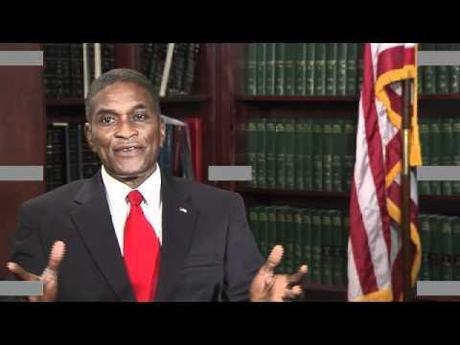
Johnny Ford
Alabama Attorney General Luther Strange should be the target of a federal bribery investigation, according to a letter sent this week to the U.S. Department of Justice by the mayor of a central Alabama city. Individuals connected to the administration of former Governor Bob Riley also should be investigated, the letter states.
Johnny Ford, who was sworn in Monday to his eighth term as mayor of Tuskegee, said in a letter dated November 5, 2012, that Strange's actions on gambling-related issues represent possible federal crimes. In his letter to George Beck, U.S. attorney for the Middle District of Alabama, Ford points to a $100,000 campaign contribution that Strange received from the Poarch Creek Indians, who operate casinos in Montgomery and Wetumpka. Ford notes that Strange has initiated raids against non-Indian gaming facilities that would be competitors for the Creeks and threatened similar action if VictoryLand reopens in Macon County, just a few miles from Tuskegee.
Public records show that Strange accepted a major campaign contribution and then took official action that would benefit the donor. That is almost identical to the allegations that were at the heart of a federal prosecution against former Alabama Governor Don Siegelman and former HealthSouth CEO Richard Scrushy. Siegelman currently is housed in a Louisiana federal prison, and Scrushy recently was released from custody after serving his term.
The irony of Strange's actions, in light of the Siegelman case, is not lost on Johnny Ford. In his letter to George Beck (see full letter at the end of this post), Ford writes:
Attorney General Strange continues to threaten the economic viability of Macon County by his threats and predatory actions with regard to the reopening of our county's largest employer, VictoryLand. Yet, at the same time, he has received at least $100,000 in campaign donations from the owners of other Indian establishments in this state with whom VictoryLand would be a vibrant competitor. Is this bribery? If not, is is so close akin to it that I cannot see the difference. Is it not the same type of quid pro quo proposition for which former Governor Siegelman was convicted and now sits in federal prison.
Ford filed an ethics complaint against Strange in late October, and several news outlets have described this week's letter as another ethics complaint. But Ford now is clearly going beyond ethics matters; his letter raises the specter of a criminal investigation:
Is it not clear that if Attorney General Strange takes money from a competitor of another gaming operation like the Poarch Creek Casinos in Montgomery and Wetumpka (only a few miles on the interstate from Macon County's VictoryLand) and subsequently threatens to shut the other competitor (VictoryLand) down if it reopens, that it is illegal? Is it not illegal to hide this payoff by laundering the funds through various Republican PACs.
Ford's call for an investigation clearly does not stop with Strange. It also includes a number of individuals who, like Strange, are politically aligned with former Governor Bob Riley, who launched a series of raids against non-Indian gaming facilities in 2010. To Beck, Ford wrote:
I hereby request that you investigate and empanel a grand jury to investigate this matter. Also, as you can see from the attached media reports, the main persons participating in this illegal and money laundering scheme are the following: Former Gov. Bob Riley, his son Rob Riley, Attorney General Luther Strange, Birmingham Attorney Eric Johnston, and Republican State Senator Brian Taylor.
No one would expect Attorney General Strange to investigate himself and any of his Republican cohorts. The federal courts have recently ruled that you have jurisdiction over this matter and that the quid pro quo payoffs are illegal in the Siegelman case. As soon as you contact me, I will provide you with documents that will clearly show the above-mentioned parties' guilt.
Will George Beck take this seriously? We see reasons to doubt it. One of Beck's prime supporters for the U.S. attorney appointment was Birmingham lawyer G. Douglas Jones, now with the firm Haskell Slaughter and once a U.S. attorney under the Clinton administration.
Doug Jones, while ostensibly a Democrat, is tightly aligned with Rob Riley via their work on a federal lawsuit against individual and entities connected to HealthSouth. Jones and Riley received a sizable chunk of some $50 million in legal fees awarded in the HealthSouth case, so it's unlikely that one of George Beck's supporters would welcome an inquiry into the Riley family.
If the precedent in the Siegelman case is applied, however, Johnny Ford has a powerful legal point. The trial court in the Siegelman case found, and the U.S. Eleventh Circuit Court of Appeals agreed, that an explicit "something for something" agreement (quid pro quo) is not necessary to prove a bribery case. The new law, which the U.S. Supreme Court refused to review, states that a jury is free to "infer" that an unlawful agreement existed from circumstantial evidence. And such evidence can include signs that the parties took steps to hide the nature of the transaction.
Ford hints that he has documentation to prove that the campaign contribution to Luther Strange was hidden via several Republican PACs. If the U.S. Department of Justice takes this seriously--and based on the Siegelman case, it should--Big Luther Strange might be in big trouble. The same applies to his allies connected to the Riley administration.
Johnny Ford Letter Re: Luther Strange
